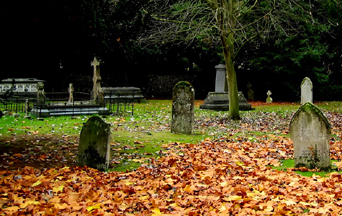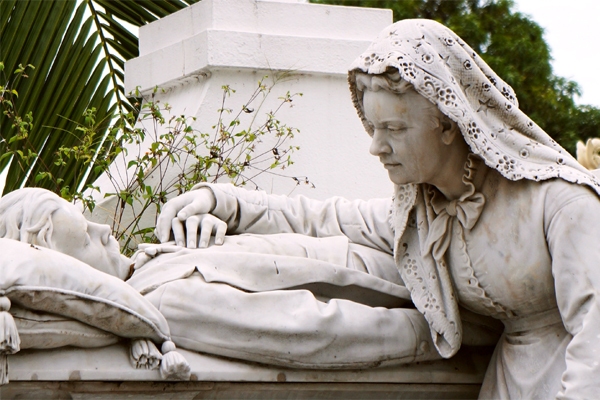
From time immemorial, people have buried the dead. Sometimes they even risked their lives to carry out this most basic duty. In times of persecution, for example, Christians put themselves in great danger to recover the bodies of martyrs so that they might receive the holy rites of Christian burial.
The Old Testament recounts the story of the elder Tobias, who, while exiled to Nineveh, observed the Hebrew Law by burying the dead against the wishes of King Sennacherib.
Even ancient peoples like the Greeks felt compelled to pay a final reverence to the deceased. Thus, Sophocles in the play “Antigone” relates the story of a sister who defies the orders of the Greek tyrant Creon not to bury her brother, whom he had defeated in battle. She proclaims the right to bury her brother came from “unwritten and unchanging laws. They are not just for today or yesterday but exist forever, and no one knows where they first appeared.”
The body is sacred and must be treated with all due dignity and respect. It has always been this way. No one needed to explain why the dead must be buried—until our time.
Recomposition: An Eco-Religious Act
Indeed, when human life is deemed disposable through abortion and euthanasia, the human corpse fares no better. However, it is hard not to be shocked by a bill now before the Washington State Legislature with a good chance of passage. Lawmakers are working toward allowing a new process called “recomposition,” by which human beings would be turned into compost.
10 Razones Por las Cuales el “Matrimonio” Homosexual es Dañino y tiene que Ser Desaprobado
Human composting is not just a practical alternative to burial. It is an eco-religious act. Its advocates openly promote it as an expression of social justice and ecological fervor. It fits into a pantheistic worldview where everything is reduced to matter in constant transformation.
The process of human composting consists of putting shrouded unembalmed human remains in a revolving cylinder with wood chips, alfalfa, and other organic matter to hasten decomposition. After a month, the body is reduced to a cubic yard of nutrient-dense soil that can be used for planting trees to benefit the Earth.
An Anti-Metaphysical Manifesto
Some practical-minded people will find little wrong with this process. They will claim that the useless corpse is put to good use by enriching the soil and preventing the release of Earth-warming carbon dioxide. What difference does it make if the person’s final resting place is at the base of a tree rather than laying in a grave?
Indeed, it would make no difference at all if there were no soul. The great accomplishment of the ecologists who created “recomposition” is not engineering the mechanical contraption that turns humans into compost. It is overturning those “unwritten and unchanging laws” embedded in human nature by which people have sensed the need for reverencing the dead from time immemorial.
The seemingly harmless process of “recomposition” is like the proclamation of an anti-metaphysical manifesto that implicitly denies the existence of the soul, the resurrection of the body, and the need for redemption. It leads to still more radical insinuations that life is meaningless and history pointless.
Eternal and Natural Law: The Foundation of Morals and Law
Great Care in Dealing With the Dead
The Church has always shown the utmost care in dealing with the dead. To bury the dead is a corporal act of mercy. The Church buries the body with great ceremony and liturgy. It maintains cemeteries and consecrates the ground that will cover the bodies of the faithful. While allowing cremation, the Church insists that even these remains be treated with great reverence and are not to be scattered about where all might tread upon them.
The reasons for this great care are many.

Temple of the Holy Spirit
The Church takes great care in her treatment of the bodies of the baptized because she recognizes that the body is not just a shell or husk that can be cast aside once the soul has departed. For Christians, burial is not the disposal of a thing. It is one aspect of caring for a person whose soul continues to exist and is in the hands of God.
The Church teaches that the body is sacred because it is the temple of the Holy Spirit, and thus the instrument by which the Christian soul expressed itself in life. Indeed, the body was washed in the waters of baptism, anointed with the oils of salvation, and nourished by the Holy Eucharist. The body was the means by which acts of charity and virtue were practiced. It is not proper that this same body be treated with indifference and neglect.
Science Confirms: Angels Took the House of Our Lady of Nazareth to Loreto
The Resurrection of the Body
The burial of the dead is linked to the belief in the resurrection of the body at the end of time. Catholics believe that all men will be resurrected for the Final Judgment. Thus, the reverence and care rendered to the body come from the honor and respect for the deceased person. One is not free to dispose of the body as if it were trash or fertilizer. The body that is buried belongs to the person who will one day be resurrected and will once again enjoy possession of it.
The belief in the resurrection of the body is essential to the Faith. To deny this truth is to reject Christ’s Resurrection and the need for the redemption. The Faith is meaningless without these dogmas that address Christ’s victory over death and the promise of life everlasting.
Death Does Not Terminate Relationships
Another reason why the Church buries the dead is the recognition that death does not terminate our relationships with the deceased. They are merely transformed. The dead are still part of the Christian community. Proper burial provides the framework whereby loved ones can fulfill their responsibilities to the dead.
To pray for the dead is a spiritual act of mercy that is encouraged by burial and visits to their graves. Masses offered for the repose of souls are yet another way to show charity toward the deceased. On their part, the poor souls in Purgatory can also intercede on behalf of the living.
 Learn All About the Prophecies of Our Lady of Good Success About Our Times
Learn All About the Prophecies of Our Lady of Good Success About Our Times
Thus, the deceased benefit from the participation of the community and parish that extend these relationships beyond death. At the same time, the community comes to recognize the impact and possible intercession of the individual upon all. The deceased person is integrated into the history of the community, recorded as it is by the Church.
Radical Ecologists and the End of Man
How different this is from the “recomposition” option now being debated. Implicit in this initiative is the modern secular notion of man as a being with no soul or purpose in life. The body is a mere phase in the constant transformation of matter. An individual has no real significance, history, or eternal destiny.
Thus, Bertrand Russell (1872-1970) could claim that man’s “origin, his growth, his hopes and fears, his loves and his beliefs, is the outcome of accidental collocations of atoms; that no fire, no heroism, no intensity of thought and feeling, can preserve an individual life beyond the grave.”
Today’s ecologists draw ever more radical conclusions from this secular view. They not only believe humans to be insignificant but also harmful to the Earth. Some denounce humanity as a virus that would best be wiped from the face of the Earth. They deplore civilization and yearn to live (or die) in harmony with nature.
Indeed, should an eco-dictatorship ever be established over the Earth (beyond the extensive socialist regulations now in place), the “recomposition” option might not be optional but mandatory.
Pondering Human Extinction
These morbid ideas about humanity are mainstream in many sectors of society. Professor Todd May of Clemson University recently penned an op-ed in The New York Times in which he asked if the extinction of the human race would be a tragedy.
Life After Death
“It may well be, then, that the extinction of humanity would make the world better off and yet would be a tragedy,” he mused. “I don’t want to say this for sure, since the issue is quite complex. But it certainly seems a live possibility, and that by itself disturbs me.”
Such dark, despairing ponderings are the backdrop of a spirit of unhappiness and depression that haunts and mocks postmodern society. Only the Church has the proper response, based as it is on the “unwritten and unchanging laws” that give meaning and purpose to life.
Of course, the fact that many do not believe in the soul or an eternal destiny does not change reality. The soul does exist. God did create and redeem humanity. There will be a general resurrection and the Last Judgment to determine our eternal destiny be it found in Heaven or Hell. Man is not an accidental collision of composted atoms but made to be an adopted son of God and co-heir to his Kingdom.
As seen on Crisis Magazine.
